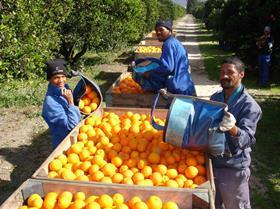
ALG Estates, one of the largest growers of South African summer citrus in the country, is preparing to extend South africa's export season in the US by acquiring a citrus farm that produces fruit later in the season.
The new farm, which is near ALG's current farming operations, is located in a more mountainous region with its own micro-climate, which causes the fruit to ripen later in the season.
'The cooler tempratures on the mountain create what is known as a micro-climate, causing the fruit to ripen later in the season,' noted Gerrit van der Merwe Jr, head of marketing for ALG Estates. 'The farm will offer soft citrus of Valencia and Mandarin oranges into January.
'This is very exciting for us as it is a start towards positioning South Africa as a year-round provider of first quality citrus.'
The farm is undergoing expansion from its current 49 acres to include 148 acres of orchards with approximately 72,000 citrus trees, capable of producing about 3,000 tonnes of citrus annually.
'Until the new trees mature fully, much of the fruit produced on the farm will remain in South Africa and other countries on the African continent,' said van der Merwe. 'While some fruit from this farm was exported to the US during this past season, larger volumes of about 50 tonnes will be ready for the US market in 2015.'
Citrus from South Africa is shipped to the US from June through to October, and is grown primarily in the Western Cape regions of Citrusdal and Clanwilliam and from the Northern Cape regions near Kimberly and Upington.
'The soft citrus from this new farm would extend the South African season to the US by about four weeks and enable us to fill a gap in the marketplace until domestic fruit from California is ready for grocery shelves,' said van der Merwe.
Advances in environmental initiatives on the new farm are appealing to US importers anxious to reduce carbon footprints along the supply chain, according to the group.
'We have listened to our importer partners and the retailers who buy our fruit and desire ongoing environmental improvements,' van der Merwe continued. 'Operations on this farm extend our commitment to the environment with reduced energy consumption and more efficient water use.
'We are able to irrigate the orchards using gravity or natural pressure rather than pumps, reducing overall energy use,' he conitnued. 'In addition, about 110 employees’ homes have been fitted with solar-powered water heating systems and pre-paid electricity meters that will help employees improve their economical use of electricity.'
With assistance from the South African Department of Environmental Affairs, a programme is underway at this new farm as well as ALG'ss other locations to reduce foreign vegetation.
'These are essentially aggressive growing weeds that threaten the naturally occurring vegetation by consuming ever precious water resources that can be used for the orchards to grow fruit and other products,' van der Merwe added. 'An extended benefit is the development of additional work opportunities in our district.'
The export program to the US began in 1999 and is coordinated by the Western Cape Citrus Producers Forum (WCCPF), a consortium of about 350 South African growers approved to export citrus to the US.



